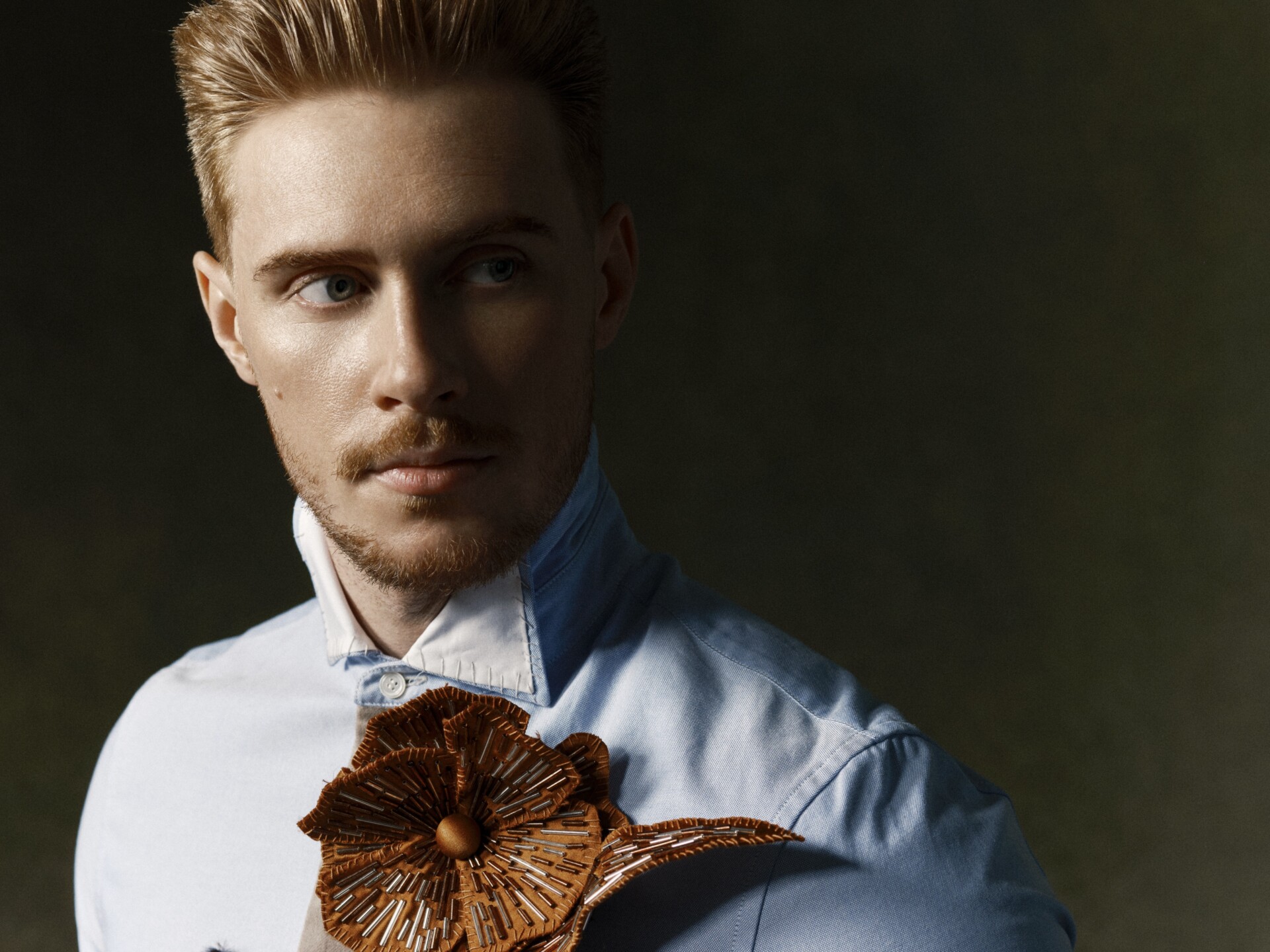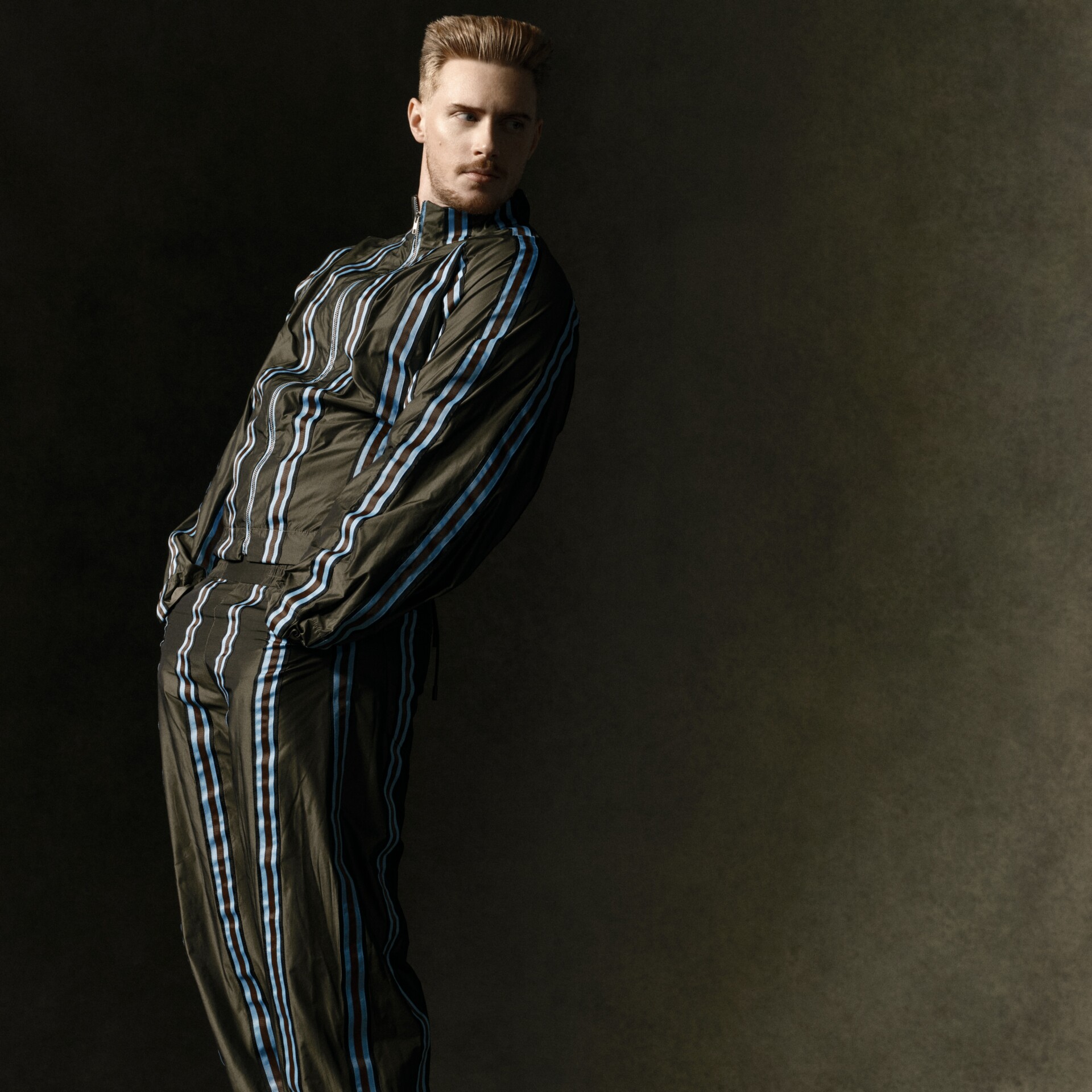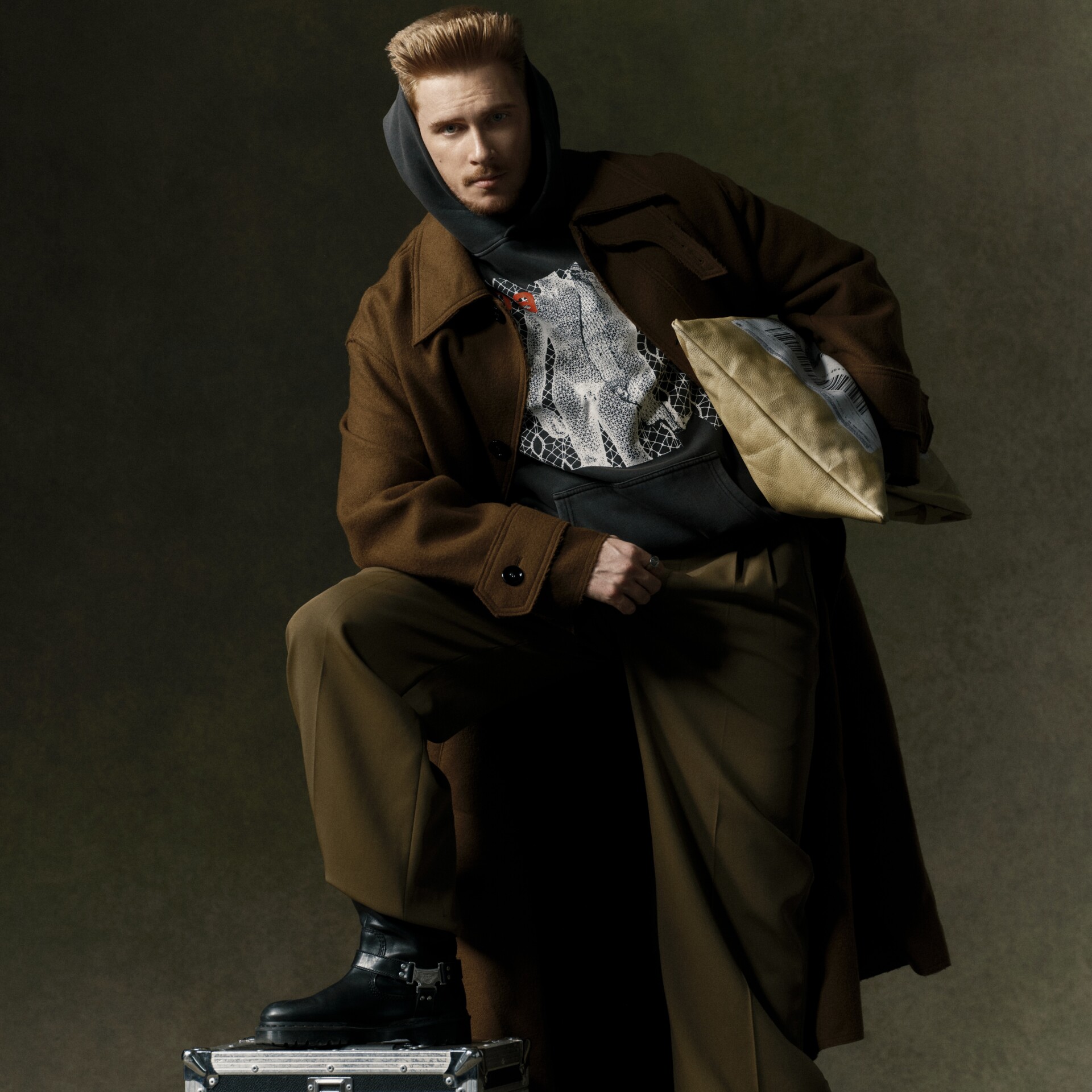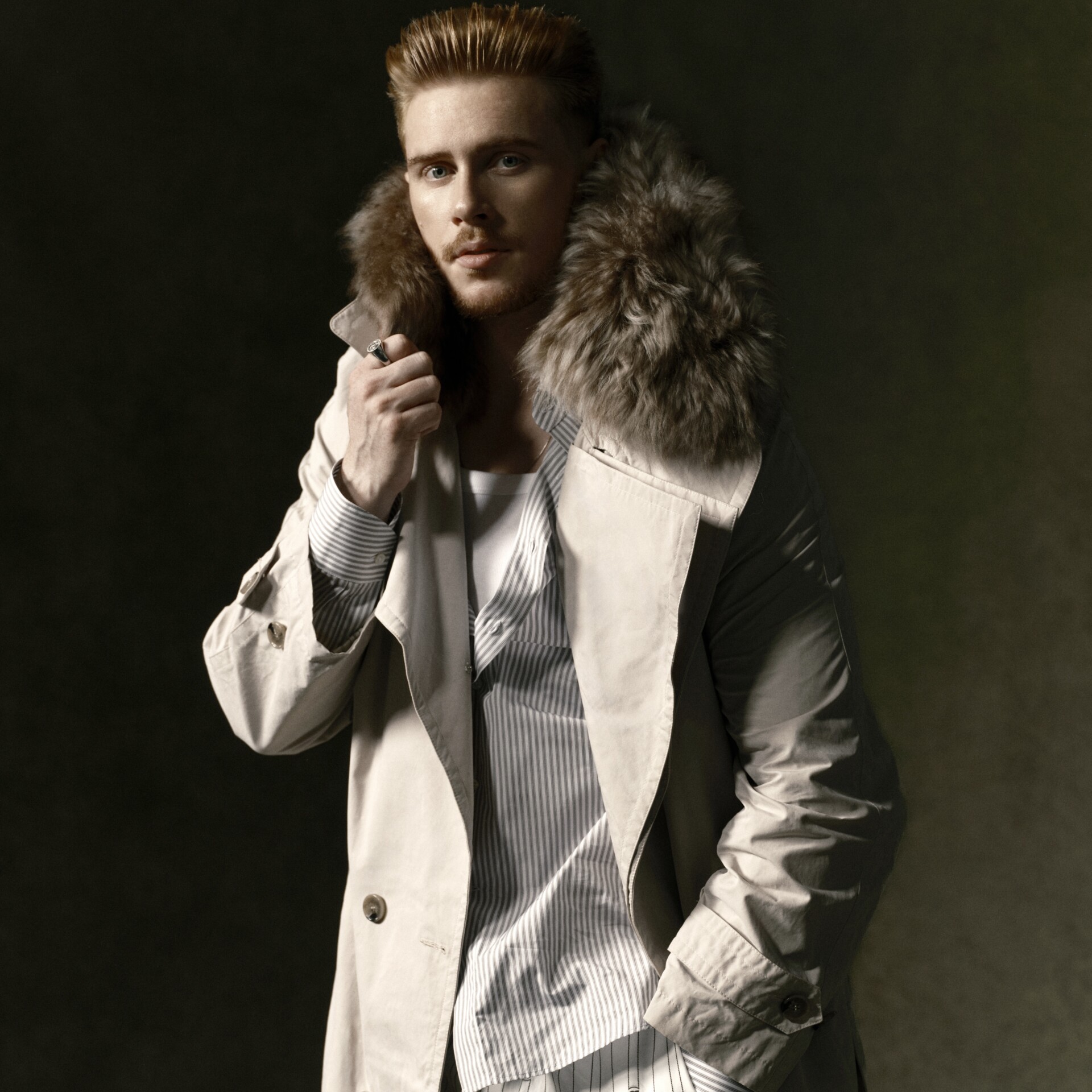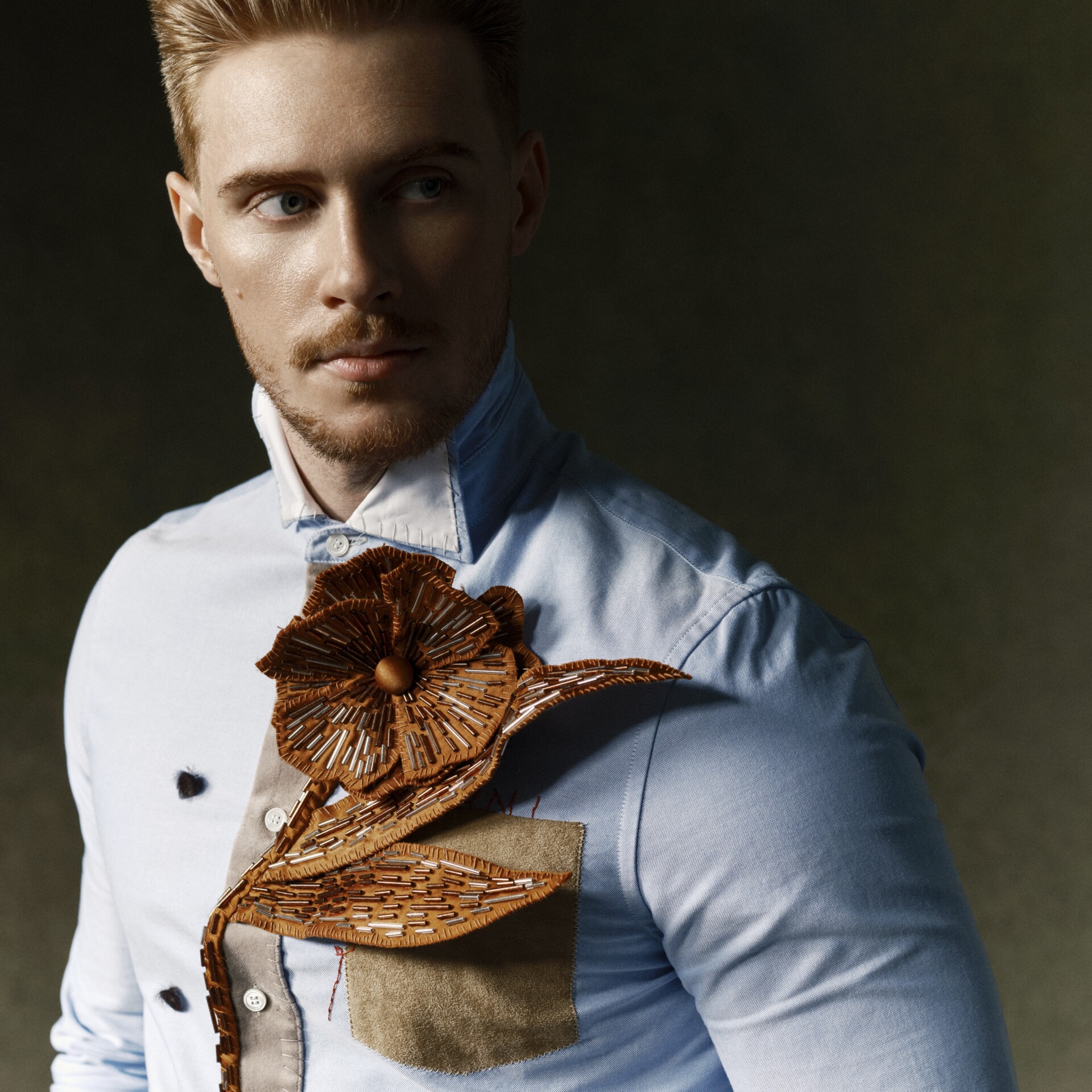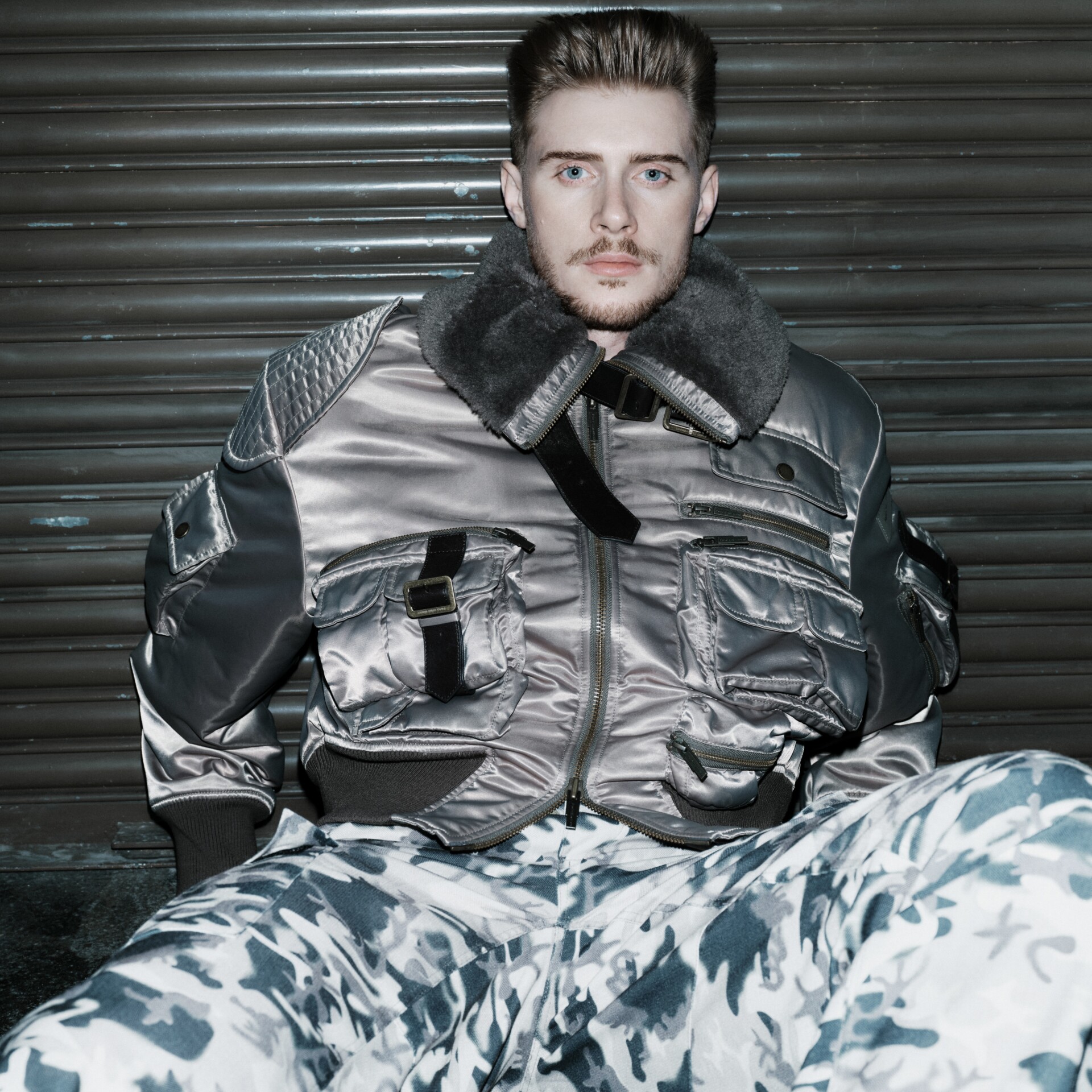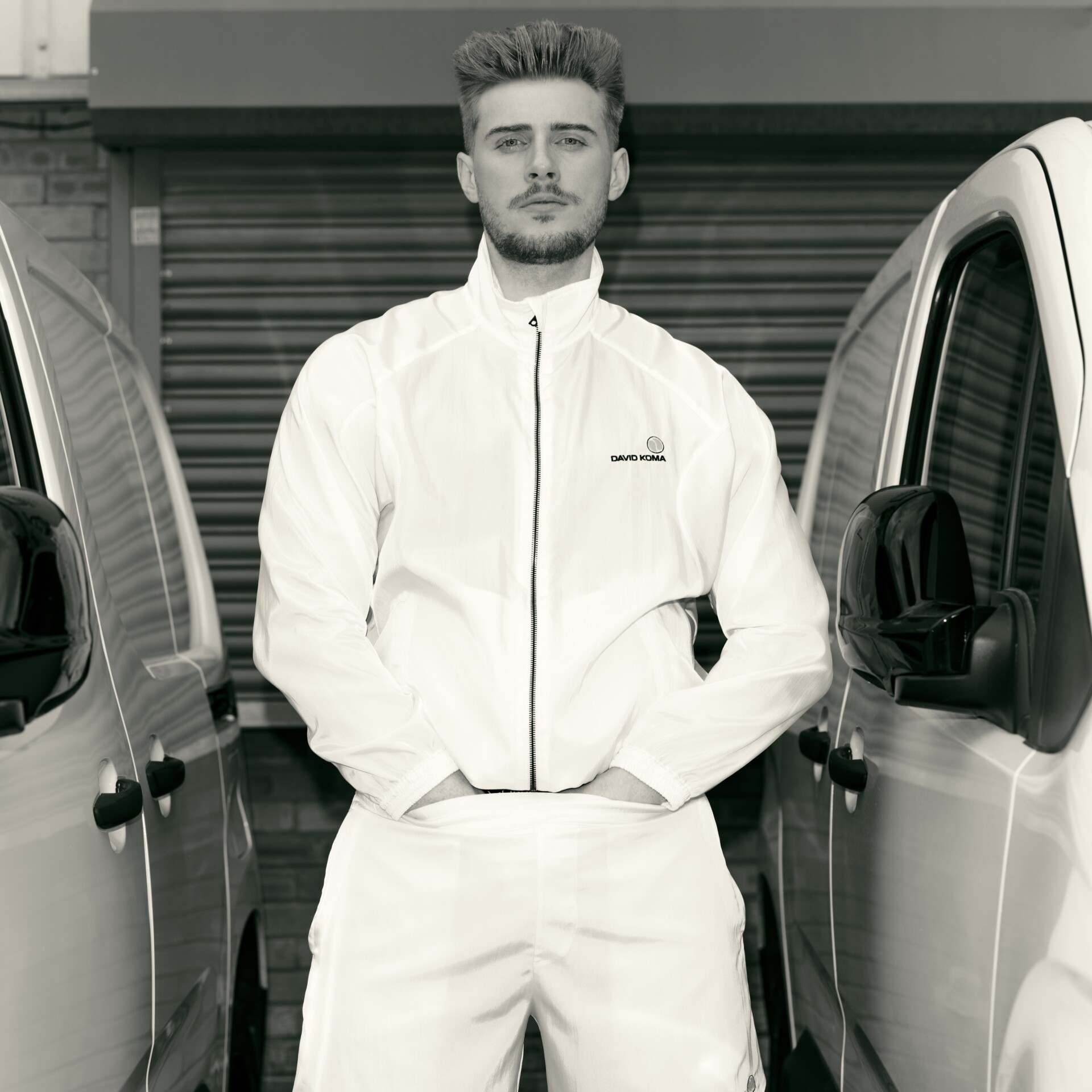It’s not every day that a series about being Queer in the military comes along — far from it — so when Max Parker got the call from Netflix’s Boots, he stood to attention.
Writer Ciarán Howley, October 2025
Born and raised in Manchester, Max recalls being a ball of energy as a child, energy which his parents encouraged him to channel into acting and the performing arts. Viewers today may remember him from turns in Emmerdale and Doctor Who, but for the 33-year old English actor, playing the guarded yet formidable drill instructor Sergeant Liam “Bobby” Sullivan was a mission of a different calibre. Alongside Sullivan, the series follows a band of new recruits in the 1990s trying to survive the gruelling trials of bootcamp, all while living under the long shadow cast by the ban on gay service members in the military.
Created by showrunner Andy Parker, the series takes its inspiration from the 2015 memoir, The Pink Marine, detailing author Gregg Cope White’s real-life story as a young gay man navigating the hypermasculine world of the U.S. Marine Corps, and finding belonging within one of America’s most rigid institutions. In Boots, White’s story is reimagined through Cameron Cope, (Miles Heizier) who flees his neglectful mother Barbara, (Vera Farmiga) for military bootcamp without her knowledge. Alongside loyal friend Ray, Cameron forges friendships, rivalries and romantic entanglements with fellow recruits from every walk of life. Yet none rattle him quite like Sergeant Sullivan, whose mission to harden Cameron into manhood soon exposes the drill instructor’s own fault lines, unearthing ghosts he’s long kept buried. For Max Parker, it’s a star-making performance. His portrayal of Sullivan is both magnetic and menacing — a layered anti-hero whose every scene commands attention— yet it’s difficult not to root for him, in spite of his many flaws.
Speaking from a hotel room overlooking Central Park, where Max is preparing for a jam-packed press junket, his voice brims with anticipation. Even amid a fraught cultural and political landscape, Boots feels like a breakout moment —one that reflects both his own evolution and the broader strides in Queer representation.
Ciarán Howley: We’ll get to Boots, but I wanted to start off with your beginnings in acting. I read that you trained at ArtsEd and started off in musical theatre — Matilda, Kiss Me, Kate. How did your background performing on stage influence you as an actor moving into film and television? Was it a big adjustment?
Max Parker: Yeah, very different — but I started young. I had a lot of energy as a kid, and my parents wanted to get rid of it, so they put me in dance and singing classes with my sisters. I loved it and just followed that path all the way up until I was about eighteen. At that point, I knew if I was going to do it seriously, I needed to start while I still had the energy.
I did about five years in musical theatre. I got to do some amazing things like the Royal Variety Performance, and a show with Cynthia Erivo, who’s obviously smashing it now. But TV and film have always been my real passion. I get bored quite easily, and I love that on set, every day is something new. One day you might be getting run over by a car, the next day you’re doing a scene with your idol. It’s the only thing I’ve never got bored of. I don’t know if I’ll be going back into theatre anytime soon, but I always remember it really fondly.
CH: Growing up then, who were your icons? Any posters on your wall?
MP: I actually didn’t have many posters on my wall. I loved Ian McKellen, I think he’s incredible. I’ve always loved fantasy. I’d love to play a kick-ass elf someday.
CH: So, your first major TV role was as Base Newman on Casualty. His storyline ended quite sadly — involving drug abuse and suicide. Was it difficult to tackle something that heavy for your first big role?
MP: Everyone finds different things challenging. What I loved about playing Base was that you really feel sorry for him — you see his journey, he’s trying to get through. When you get a character like that on the page, it’s exciting. When I told people I was playing a heroin addict on Casualty, they assumed I’d die in one episode, but I actually had a really nice arc where you almost think he might make it out. It was a great first job. I didn’t really have any training in TV, so being on set was a baptism of fire. I remember one time, the crew said, “Okay, artists, step off set.” I didn’t know what that meant, so I went back to my dressing room and started getting changed — I thought we’d finished filming! They called me back like, “We’re ready for you on set.” So yeah, real learning-on-the-job stuff.
CH: I’ve always wondered — are soap operas as intense as they seem?
MP: Yeah, Casualty was a bit different — it’s a serial drama, one episode a week. But when I did Emmerdale, that was a whole new skill. It’s like speed learning — sometimes you get so much material at once, and it changes on the day. It’s filmed with a three-camera setup, which adds its own challenges. Every job I’ve done has been a new learning curve, and I’m really grateful to the soaps — not just for the experience, but for the sense of family you get from them.
CH: So, onto Boots — where were you when you first got the script? When you read it, did you immediately feel it was going to be a great part?
MP: When I first got the audition, they only sent one scene, from episode one. I remember thinking it was such a ball ache to learn because there was so much interjecting — every line had a military command in between. It was like trying to pat your head and rub your tummy at the same time.
At first, I didn’t really see myself as Sergeant Sullivan. We usually see drill instructors in movies as those classic American types — grey hair, ex-military, very intense. But as I went through more rounds of auditions and got to read more of the script, I started thinking, I really want this. I could see myself in it. By the time they told me there was another round, I was like, “Please, no more! Just give me the job!”
CH: How many rounds did you do in total?
MP: A lot. I think I was the wildcard — they wanted to see what I could do. From start to finish, I probably did about eight rounds.
CH: Is that standard?
MP: Not really. In musical theatre, you might do that many, but most of the TV and film jobs I’ve had came from had one or two auditions, sometimes even just a self-tape. But this one was definitely a marathon.
CH: The character is so intense — when we first meet him, he seems almost unhinged, but there’s so much more going on. How did you find preparing for that kind of role — especially the drill instructor persona?
MP: Yeah, the preparation was intense. I did a lot of research, and they sent me this three-page document where every line was a link to an hour-long video of real military training footage. We also had an incredible team of military advisers on set. Some were still serving, some retired, and they were always on hand to help with the technical stuff — making sure everything we did was authentic.
Before filming, we went through a proper boot camp. I actually trained with the recruits rather than the other DIs, because I wanted to understand what they were going through — how they’d be feeling. I did the obstacle courses, fired the weapons, everything they did, so I could drill them properly on screen.
CH: So, you basically got a real taste of military life?
MP: I mean, I don’t come from a military background, and I’m not American, but it gave me a huge respect for what those guys do. You realise how important accuracy is to people who’ve served; they really wanted it portrayed correctly. We didn’t go through the psychological side — like being screamed at — but the physical training was great fun. I’m competitive, and a lot of the guys on the show were too. We’d be racing through obstacles, seeing who could do the most pull-ups.
CH: Set against the 1990s, Boots explores the dark history of homosexuality being criminalised in the military. Did being part of that project shape how you think about masculinity, sexuality, and identity, or the pressures around both?
MP: Yeah, definitely. When you’re filming something like that, you take away so much more than you expect. Watching the show back, what struck me most was how every character’s story felt like a different flavour — everyone’s there for a reason. Some of them are running from family, some are there because it’s either that or prison, and then you’ve got Cameron — played brilliantly by Miles — who joins with his best friend, not realising it’s illegal for him to even be there because he’s gay. It’s really powerful to see the bond between them, the acceptance, even in that era. And it’s that connection — that sense of unity — that gets them through, which is a great metaphor for life. There’s a RuPaul quote that goes something like, “You have to use every colour in the crayon box.” I’ve probably butchered that, but it’s true — Boots is serious and moving, but it’s also funny and full of heart. People will be surprised — it’s not just a show about the military or about being gay.
CH: I went in expecting this really heavy, tragic story, but it’s actually warm, and full of laughs. Stepping aside slightly, there’s been a lot of debate lately about whether non-Queer actors should play Queer roles. What’s your take on that?
MP: Queer stories are important. Although I have been moved by performances like the ones seen in Call Me By Your Name, both played by straight men, it’s about finding the person who can tell the story best and tell it truthfully and authentically. Queer artists should be given more opportunity to play Queer roles. There are so many of us, why wouldn’t we be chosen?
CH: Back in 2020, you came out in Attitude magazine. There’s often talk about actors in Hollywood feeling pressure to hide their sexuality. Why was it important for you to come out publicly at that time?
MP: I think there’s always a right time to come out — and it’s different for everyone. Sometimes people don’t come out because they’re not in the right environment, or they don’t have the right support network. I didn’t know how it might affect my career, but I wanted to live happily and authentically. So far, it’s been great. It’s always better to live openly than in shame. You see that same pressure in Boots — the way Cameron tries to hide who he is, and how it eats away at him. It’s like a pressure cooker. No one should have to live like that. I was lucky — I had a great group around me, my family was accepting, and I was willing to take the risk.
CH: When it comes to new projects, what do you look for? What’s a sign of a good script or a well-written character for you?
MP: Weirdly, I’d say tingles. You know when you read something and it just clicks? Sometimes I get an audition and I know right away whether I can see myself in it or not. When you’re juggling a few self-tapes at once, you don’t always have time to dive deep — I’m a slow learner with lines — so I have to slam down the dialogue and get through the script. But if I’m pressed for time and still find myself wanting to read more, that’s when I know it’s a good one. The best scripts always have well-rounded characters. It’s hard to get into a story if you don’t actually like or believe the people in it.
CH: So, if you could work with any actor or director — your dream collaboration — who would it be?
MP: Actor-wise, Leonardo DiCaprio. Director-wise, Peter Jackson. I think Ryan Murphy is a genius — I’m really excited for his new Monster series on Netflix.
CH: Is this the one about Ed Gein?
MP: Yeah, that’s the one. Apparently a lot of famous horror films were inspired by him — Psycho, for example.
CH: Would you play a serial killer if you were offered the role?
MP: Honestly, that’s kind of the dream! It sounds weird to say, but serial killers are such dark, fascinating characters — a real challenge to explore. I watch so many true-crime documentaries, I feel like I’ve already done my research! They say if you fall asleep to murder documentaries, it’s a sign you’re a psychopath…Maybe that’s not a good look!
CH: And if you hadn’t become an actor, what do you think you might have done instead?
MP: I used to want to be a vet — until I developed a fear of needles! I also really wanted to be a detective. I’m still desperate to play one on screen someday. I did photography for a while too, so I think I would’ve done something creative regardless. There are the achievable dreams, like photography, and then the slightly far-fetched ones — like being a private investigator!
CH: Hey, never say never. This year you turned thirty-three, which is said to be something of a milestone age, depending on who you ask. Did you have any big revelations or turning points?
MP: Yeah — I got married! That’s a big one.
CH: Congratulations!
MP: Thank you. That, and Boots coming out — it feels like my first real break into the American market. Thirty-three is meant to be a magic number, so maybe that’s good luck! I’m excited for 34.
CH: What’s next? Anything you can tease for the year ahead?
MP: I can’t really talk about what’s coming, but I’m very excited. It’s a tricky time to be an actor — there’s a mix of talent and luck involved, and the industry’s constantly changing. But I just hope people love Boots and that it opens doors for everyone in the cast. There are so many newcomers in the show who deserve big opportunities — they’re so talented.
CH: I was surprised by how many new faces there were — aside from Vera Farmiga, obviously, who’s an icon. Conjuring stans rise!
MP: Oh, absolutely.
CH: And now that you’re in New York, what are your plans while you’re here?
MP: It’s non-stop press at the moment, but exciting stuff. We’ve got a full junket today, and tomorrow the cast is heading to Times Square to see our billboard, which is surreal. I came here when I was twenty, and I remember driving through Times Square from the airport — I got emotional because it felt so iconic. Now to be going back there and seeing my face on a billboard. It’s wild. This view, this city… What the fuck, honestly!
Talent MAX PARKER
Photographer PAWEL HERMAN
Stylist JUSTIN HAMILTON represented by A-FRAME AGENCY
Grooming BRADY LEA represented by A-FRAME AGENCY
Camera 1st Assistant CIARAN CHRISTOPHER
Styling Assistant LORNA LANE, KATIE SOMAVIA
